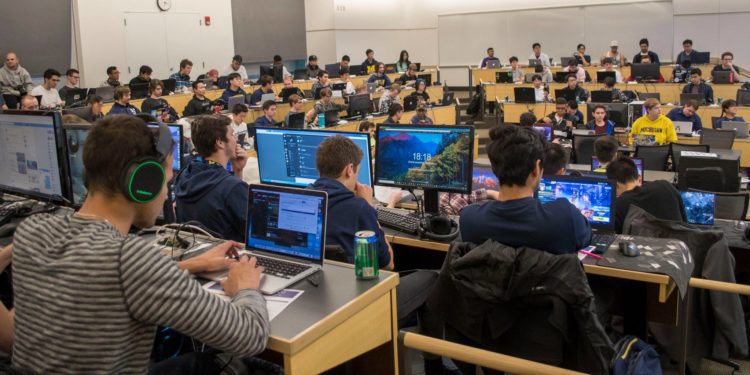At the University of Michigan, esports participants will finally get to wear the “block M” along with the rest of the university’s sports programs.
Cybbi Barton, the University of Michigan program manager of club sports and esports, worked closely with Alexander Downs, the current president of the student-led organization Arbor Esports and future student coordinator for the competitive esports program.
The student organization has been a key player for the cultivation of a competitive esports program at Michigan. While it will continue to exist after the creation of the competitive esports program, its role has been vital for building the competitive program.
“We’ve been utilizing them a ton with questions and getting answers and student input on developing this program,” said Barton. “We knew other institutions across the country were creating these esports programs, and it was kind of in the back of our heads but nothing that we made movement on until we got some demands from the students.”
And the demand was strong. Arbor Esports boasts 200 to 250 students at events during peak seasons. “It’s a really great thing, but there’s certain resources as a volunteer student organization we just don’t have access to,” said Downs. “By the university legitimizing the program, and elevating it to that level, the same as other rec sports and giving students access to those resources, is a really big deal.”
One of those resources is a specialized location for the esports program that can host the large following of the organization. While the exact location is still undecided, Barton is confident the program will find a home before the first season in Fall 2019.
In fact, it’s sense of community that put competitive esports on the same level as other rec sports teams. “This community may or may not participate in traditional sports, so esports is an outlet where you can cultivate these teams,” explained Downs. “That’s the biggest benefit – getting students out of their dorm rooms and playing with people in a public space, learning interpersonal skills instead of playing on their personal computer at home.”
Another added benefit of the esports program to campus rec is getting a different population of students stepping into the facility and having them feel welcomed. “A benefit, especially for these students, is being able to call themselves University of Michigan and to wear the block M – the pride of the students who go here,” said Barton.
Not only will the competitive esports program nurture a sense of community and pride, but it will also help develop students into leaders. “This program is going to be completely student-run, just like a lot of our programs within rec sports, and so capitalizing on those leadership skills is why we do what we do,” said Barton.
At the end of the day, the creation of the University of Michigan Esports Program was made possible through communication. Students asked for what they wanted, and Michigan is going to deliver. “If someone hadn’t said anything for five years about an esports program, we wouldn’t be here right now,” said Downs. “It’s important to emphasize that having the university support and backing is a big deal to the competitive students.”










